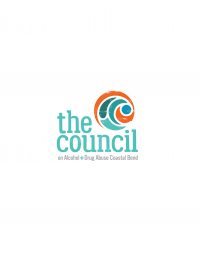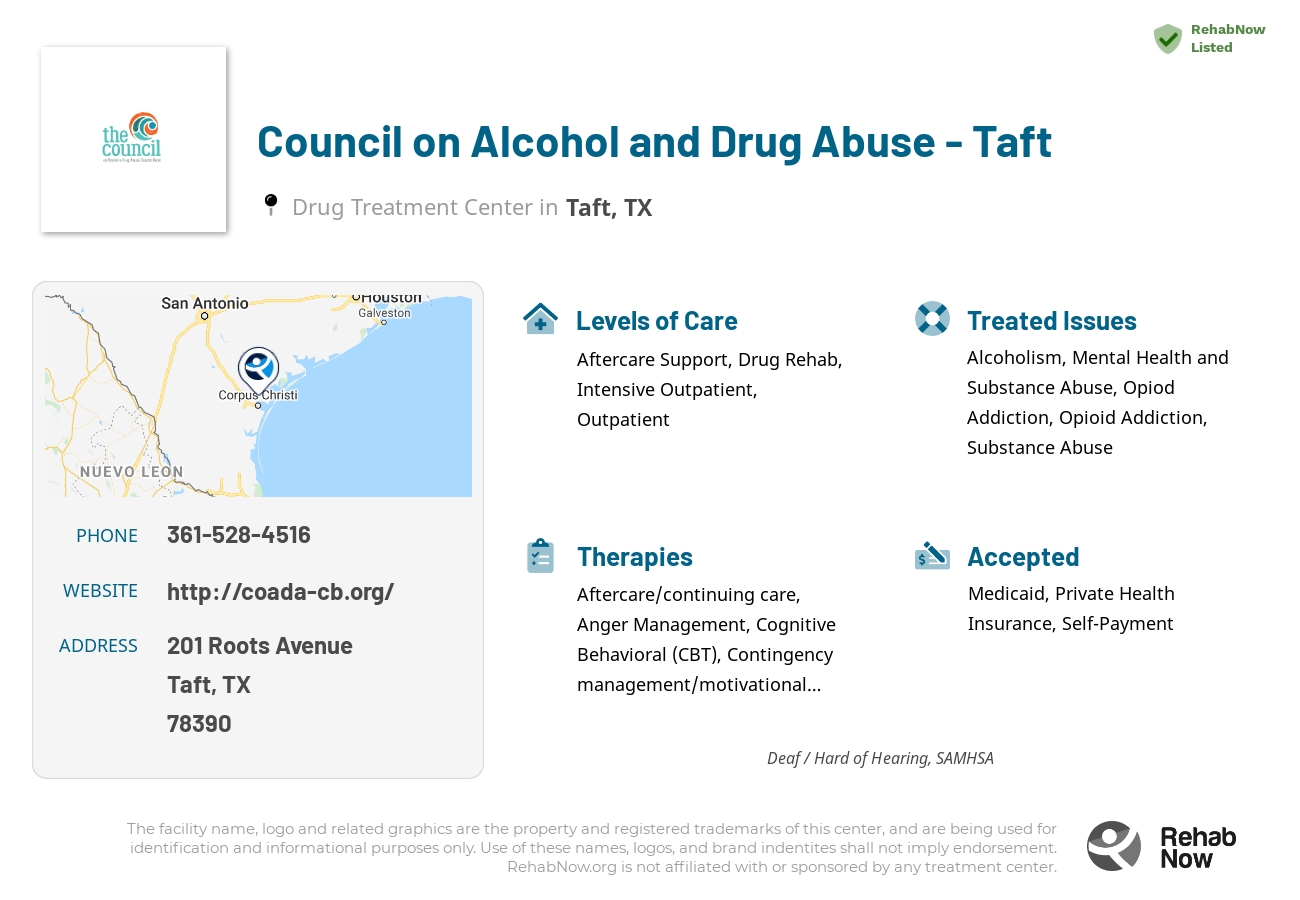Council on Alcohol and Drug Abuse - Coastal Bend
Drug Rehab Center in Taft, Texas
The Council on Alcohol and Drug Abuse - Coastal Bend is a treatment center in Taft, TX that offers a range of flexible and non-judgmental care for alcohol and drug abuse, dual diagnosis, and opioid addiction using various treatment methods such as DBT, CBT, and Family Therapy.
About This Texas Facility
Council on Alcohol and Drug Abuse (CADA) - Coastal Bend is a renowned treatment center in Taft, TX, specialized in treating alcoholism, opioid addiction and co-occurring disorders. The center provides a variety of evidence-based treatments, such as Dialectical Behavioral Therapy (DBT), Family Therapy, Group Therapy, Individual Therapy, Life Skills and Motivational Interviewing, as well as a comprehensive aftercare program for those who have completed their treatment and drug rehab program.
CADA - Coastal Bent is accredited by the Substance Abuse and Mental Health Services Administration (SAMHSA) and accepts private health insurance. The staff at CADA - Coastal Bend are certified and dedicated professionals with extensive experience in addiction treatment to ensure the individualized experience for each of their clients. The center also offers group therapy, education and support to families, along with access to free resources and support. CADA understands the challenges of addiction and offers a safe and supportive environment to help those in need to recover from the illness of addiction.
Genders
Ages
Modality
Additional
Accreditations
SAMHSA
Conditions and Issues Treated
Opioid addiction treatment should be done in a medically supervised drug rehab. Opioid addiction treatment will include detoxification and drug rehab counseling to help both the user and their loved ones learn how to live a successful sober lifestyle. Methadone, buprenorphine, and naltrexone are three medications that can help treat opioid addiction. Individual drug rehab counseling sessions can be helpful to discuss any questions or concerns with the drug treatment program.
Levels of Care Offered at Council on Alcohol and Drug Abuse - Coastal Bend
This center offers a variety of custom treatment tailored to individual recovery. Currently available are Aftercare Support, Drug Rehab, Intensive Outpatient, Outpatient, with additional therapies available as listed below.
The Intensive Outpatient Program at Council on Alcohol and Drug Abuse - Coastal Bend is for those who need intensive care but would rather get it in the comfort of their own home. The treatment programs vary in duration and intensity and can be tailored to suit the individual’s needs. IOP helps the patient to live at home and gradually get back to their routine life.
Daily trips to the hospital that provides the treatment include intensive outpatient services (IOP). The patients gradually get back to their everyday lives. IOP benefits the most when the patients have a supportive family member or friend who can encourage them in their recovery.
Individuals struggling with drug addictions can get help from several treatment options, including inpatient and outpatient programs. Outpatient drug treatment programs can also provide patients with different levels of care, usually depending on the patient’s degree of addiction.
At an outpatient program in Taft, a patient will attend a recovery program during the day and return home in the evening. Suppose a patient is struggling with drug addiction. In that case, an outpatient program can serve as an effective transition point during the recovery process.
Aftercare is a part of drug rehabilitation. It is also known as “post-treatment support.” Aftercare programs are available for addicts after they complete drug rehab. It is often the final step in the recovery process. The goal of aftercare is to ensure that addicts maintain their achievements in rehab and do not relapse. Professionals generally provide aftercare (including addiction therapists, physicians, social workers, psychologists) and involve individual and group therapy sessions.
Therapies & Programs
Individual therapy is a critical component of addiction recovery. It allows the patients to go deep into their core issues and discover how to handle those problems better. Therapy can be conducted in individual sessions as well as group settings. In individual therapy for addiction, the patient meets with their therapist one-on-one to focus on the underlying issues. This allows patients to open up and discuss personal topics they may not feel comfortable discussing in a group setting. This type of therapy can help develop solutions specific to each patient, which helps speed up the recovery process.
Family therapy is a crucial part of drug treatment and getting sober. It is one of the most effective ways to help addicts stay on the path to long-term sobriety. When a drug addict decides that they want to try and get sober, it takes the support of every person they love to succeed. It can be incredibly difficult for loved ones to watch an addict go through the pain and suffering of withdrawal, but by being there with them and supporting them, they can help to make sure that the addiction never returns.
One of the most important parts of family therapy is the relapse prevention plan. During treatment, therapists and doctors will often sit down with the addict and their family to develop a plan in case the addict ever feels like they want to use again. This plan should involve steps the addict and family can take together to prevent them from relapsing in the future. An addict’s family can play a vital part in helping them to avoid relapse because they can spot the warning signs and help them get back on track before it becomes too much of a problem.
Group therapy helps prevent addicts from feeling isolated or unique in their situation by offering a sense of comfort and fellowship. It also creates a forum for addicts to build their support systems and learn from each other. The group therapy sessions at Council on Alcohol and Drug Abuse - Coastal Bend occur in a group setting rather than one-on-one to create a safer, controlled environment where addicts feel comfortable.
Dialectical Behavior Therapy was developed in the 1980s to treat chronically suicidal individuals. It is a cognitive-behavioral therapy that combines strategies derived from Zen Buddhism, such as mindfulness training. DBT has been adapted for use with other types of psychiatric problems, including substance abuse and personality disorders. DBT aims to help patients change their thinking and behavior, instead of relying on medication.
Cognitive Behavioral Therapy (CBT) is a common therapeutic approach to help drug addicts. It teaches addicts new ways of thinking and behaving so that they can avoid relapse. There are several forms of CBT used in drug rehabilitation centers.
Cognitive Restructuring helps addicts identify faulty, negative thinking so that they can work together with the therapist to find healthier ways of thinking, resulting in better decision-making.
Cognitive Behavioral Therapy for Addiction uses the principles of CBT to help treat addiction. It focuses on specific aspects of each person’s thinking, feeling, physiology, and behavior. It aims to identify specific problems in these areas and create a personalized treatment strategy.
The best drug treatment centers offer various services to help addicts learn how to live without drugs. Since addiction is a chronic physical and mental illness, addicts need to learn as many life skills as possible to help them stay clean and sober.
Many drug treatment centers like Council on Alcohol and Drug Abuse - Coastal Bend offer life skills activities as part of their addiction recovery programs. Examples include cooking classes, employment training, resume writing seminars, parenting classes, and computer training. When addicts have various life skills to lean on, they’re better equipped to put their addiction behind them for good.
The primary goal of life skills activities at drug treatment centers like Council on Alcohol and Drug Abuse - Coastal Bend is to help addicts recover from addiction and learn how to live a useful, productive life. Life skills activities help addicts find employment, take care of their families, and give back to the community. After learning about these various life skills, addicts are better prepared to return to society and lead happy healthy lives.
Payment Options Accepted
For specific insurance or payment methods please contact us.
Is your insurance accepted?
Ask an expert, call (888) 674-0062
Council on Alcohol and Drug Abuse Associated Centers
Discover treatment facilities under the same provider.
- Council on Alcohol and Drug Abuse - Coastal Bend in Corpus Christi, TX
- Council on Alcohol and Drug Abuse - Coastal Bend in Corpus Christi, TX
- Council on Alcohol and Drug Abuse - Taft in Taft, TX
Learn More About Council on Alcohol and Drug Abuse Centers
Additional Details
Specifics, location, and helpful extra information.
Taft, Texas 78390 Phone Number(361) 528-4516 Meta DetailsUpdated November 25, 2023
Staff Verified
What else do people call Council on Alcohol and Drug Abuse – Coastal Bend?
People have occasionally also searched for “Council on Alcohol and Drug Abuse - Coastal Bend in Texas”
Patient Reviews
There are no reviews yet. Be the first one to write one.
Taft, Texas Addiction Information
Texas is one of the primary hubs for drug smuggling into the country. The border between Texas and Mexico is more than 1,000 miles long. More than 10 million residents use alcohol every year and more than 25% of those are minors. Alcohol and drug use has become so common in Texas that almost 15% of all deaths can be attributed to these substances.
Treatment in Nearby Cities
- Bryan, TX (196.6 mi.)
- Texarkana, TX (426.0 mi.)
- Canton, TX (314.7 mi.)
- La Grange, TX (137.1 mi.)
- Childress, TX (476.3 mi.)
Centers near Council on Alcohol and Drug Abuse - Coastal Bend
The facility name, logo and brand are the property and registered trademarks of Council on Alcohol and Drug Abuse - Coastal Bend, and are being used for identification and informational purposes only. Use of these names, logos and brands shall not imply endorsement. RehabNow.org is not affiliated with or sponsored by Council on Alcohol and Drug Abuse - Coastal Bend.






